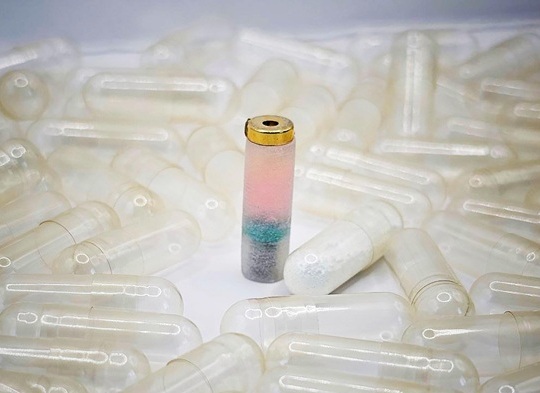Engineered IgM Antibody Administered Intranasally May Be More Potent at Inhibiting SARS-CoV-2 and Its Variants than Current Antibody Therapies
|
By HospiMedica International staff writers Posted on 10 Jun 2021 |

Illustration
An IgM version of an anti-SARS-CoV-2 IgG monoclonal antibody is being developed as an intranasally administered agent for the treatment and prevention of COVID-19.
IGM Biosciences, Inc. (Mountain View, CA, USA), a clinical-stage biotechnology company focused on creating and developing engineered IgM antibodies, has expanded its IgM antibody platform into infectious diseases, with the anticipated advancement of a new pipeline candidate, IGM-6268, into the clinic in the third quarter of 2021. IGM-6268, an engineered human IgM monoclonal antibody designed for the treatment and prevention of COVID-19, has been shown in preclinical studies to be highly effective in preventing and treating COVID-19 after intranasal administration.
Due to its ability to bind to SARS-CoV-2 with greater strength, IGM-6268 offers advantages over current IgG treatments, including 100x to 1,000x greater neutralizing potency than comparable IgG antibodies, and the ability to effectively neutralize all evaluated mutant Variants of Concern (VoC) and Variants of Interest (VoI). Results from a recent study found that, among the anti-SARS-CoV-2 IgG, IgA, and IgM antibodies screened, IgM antibodies were in all cases significantly more potent than IgG and IgA antibodies in neutralizing virus.
IGM-6268 was shown to be effective for prophylaxis and treatment in animal models when administered intranasally, and also demonstrated significantly increased potency against wild type SARS-CoV-2 and emerging natural viral variants, such as the current UK, South African and Brazilian VoC strains, VoIs, as well as the antibody escape mutants for the current Emergency Use Authorized antibodies. In the company’s in vivo models, IGM-6286 appeared to be well-tolerated, did not appear to present any adverse safety signals, and demonstrated good persistence in the sinus following intranasal administration.
“The ability to transform IgG antibodies into potently neutralizing IgM antibodies for the possible prevention and treatment of COVID-19 with broad coverage of VoCs, VoIs and viral escape mutants is a very exciting application of our IgM platform that could address an urgent unmet medical need,” said Fred Schwarzer, CEO of IGM Biosciences. “We look forward to advancing IGM-6268 as quickly as possible and plan to initiate a clinical study in the third quarter of this year, marking the expansion of our IgM antibody platform from oncology into infectious diseases.”
Related Links:
IGM Biosciences, Inc.
IGM Biosciences, Inc. (Mountain View, CA, USA), a clinical-stage biotechnology company focused on creating and developing engineered IgM antibodies, has expanded its IgM antibody platform into infectious diseases, with the anticipated advancement of a new pipeline candidate, IGM-6268, into the clinic in the third quarter of 2021. IGM-6268, an engineered human IgM monoclonal antibody designed for the treatment and prevention of COVID-19, has been shown in preclinical studies to be highly effective in preventing and treating COVID-19 after intranasal administration.
Due to its ability to bind to SARS-CoV-2 with greater strength, IGM-6268 offers advantages over current IgG treatments, including 100x to 1,000x greater neutralizing potency than comparable IgG antibodies, and the ability to effectively neutralize all evaluated mutant Variants of Concern (VoC) and Variants of Interest (VoI). Results from a recent study found that, among the anti-SARS-CoV-2 IgG, IgA, and IgM antibodies screened, IgM antibodies were in all cases significantly more potent than IgG and IgA antibodies in neutralizing virus.
IGM-6268 was shown to be effective for prophylaxis and treatment in animal models when administered intranasally, and also demonstrated significantly increased potency against wild type SARS-CoV-2 and emerging natural viral variants, such as the current UK, South African and Brazilian VoC strains, VoIs, as well as the antibody escape mutants for the current Emergency Use Authorized antibodies. In the company’s in vivo models, IGM-6286 appeared to be well-tolerated, did not appear to present any adverse safety signals, and demonstrated good persistence in the sinus following intranasal administration.
“The ability to transform IgG antibodies into potently neutralizing IgM antibodies for the possible prevention and treatment of COVID-19 with broad coverage of VoCs, VoIs and viral escape mutants is a very exciting application of our IgM platform that could address an urgent unmet medical need,” said Fred Schwarzer, CEO of IGM Biosciences. “We look forward to advancing IGM-6268 as quickly as possible and plan to initiate a clinical study in the third quarter of this year, marking the expansion of our IgM antibody platform from oncology into infectious diseases.”
Related Links:
IGM Biosciences, Inc.
Latest COVID-19 News
- Low-Cost System Detects SARS-CoV-2 Virus in Hospital Air Using High-Tech Bubbles
- World's First Inhalable COVID-19 Vaccine Approved in China
- COVID-19 Vaccine Patch Fights SARS-CoV-2 Variants Better than Needles
- Blood Viscosity Testing Can Predict Risk of Death in Hospitalized COVID-19 Patients
- ‘Covid Computer’ Uses AI to Detect COVID-19 from Chest CT Scans
- MRI Lung-Imaging Technique Shows Cause of Long-COVID Symptoms
- Chest CT Scans of COVID-19 Patients Could Help Distinguish Between SARS-CoV-2 Variants
- Specialized MRI Detects Lung Abnormalities in Non-Hospitalized Long COVID Patients
- AI Algorithm Identifies Hospitalized Patients at Highest Risk of Dying From COVID-19
- Sweat Sensor Detects Key Biomarkers That Provide Early Warning of COVID-19 and Flu
- Study Assesses Impact of COVID-19 on Ventilation/Perfusion Scintigraphy
- CT Imaging Study Finds Vaccination Reduces Risk of COVID-19 Associated Pulmonary Embolism
- Third Day in Hospital a ‘Tipping Point’ in Severity of COVID-19 Pneumonia
- Longer Interval Between COVID-19 Vaccines Generates Up to Nine Times as Many Antibodies
- AI Model for Monitoring COVID-19 Predicts Mortality Within First 30 Days of Admission
- AI Predicts COVID Prognosis at Near-Expert Level Based Off CT Scans
Channels
Critical Care
view channel
AI Heart Attack Risk Assessment Tool Outperforms Existing Methods
For decades, doctors have relied on standardized scoring systems to assess patients with the most common type of heart attack—non-ST-elevation acute coronary syndrome (NSTE-ACS). The GRACE score, used... Read more
'Universal' Kidney to Match Any Blood Type
Blood-type incompatibility has long been one of the greatest obstacles in organ transplantation, forcing thousands of patients—particularly those with type O blood—to wait years longer for compatible donors.... Read moreSurgical Techniques
view channel
Minimally Invasive Endoscopic Surgery Improves Severe Stroke Outcomes
Intracerebral hemorrhage, a type of stroke caused by bleeding deep within the brain, remains one of the most challenging neurological emergencies to treat. Accounting for about 15% of all strokes, it carries... Read more
Novel Glue Prevents Complications After Breast Cancer Surgery
Seroma and prolonged lymphorrhea are among the most common complications following axillary lymphadenectomy in breast cancer patients. These postoperative issues can delay recovery and postpone the start... Read morePatient Care
view channel
Revolutionary Automatic IV-Line Flushing Device to Enhance Infusion Care
More than 80% of in-hospital patients receive intravenous (IV) therapy. Every dose of IV medicine delivered in a small volume (<250 mL) infusion bag should be followed by subsequent flushing to ensure... Read more
VR Training Tool Combats Contamination of Portable Medical Equipment
Healthcare-associated infections (HAIs) impact one in every 31 patients, cause nearly 100,000 deaths each year, and cost USD 28.4 billion in direct medical expenses. Notably, up to 75% of these infections... Read more
Portable Biosensor Platform to Reduce Hospital-Acquired Infections
Approximately 4 million patients in the European Union acquire healthcare-associated infections (HAIs) or nosocomial infections each year, with around 37,000 deaths directly resulting from these infections,... Read moreFirst-Of-Its-Kind Portable Germicidal Light Technology Disinfects High-Touch Clinical Surfaces in Seconds
Reducing healthcare-acquired infections (HAIs) remains a pressing issue within global healthcare systems. In the United States alone, 1.7 million patients contract HAIs annually, leading to approximately... Read moreHealth IT
view channel
Printable Molecule-Selective Nanoparticles Enable Mass Production of Wearable Biosensors
The future of medicine is likely to focus on the personalization of healthcare—understanding exactly what an individual requires and delivering the appropriate combination of nutrients, metabolites, and... Read moreBusiness
view channel
Philips and Masimo Partner to Advance Patient Monitoring Measurement Technologies
Royal Philips (Amsterdam, Netherlands) and Masimo (Irvine, California, USA) have renewed their multi-year strategic collaboration, combining Philips’ expertise in patient monitoring with Masimo’s noninvasive... Read more
B. Braun Acquires Digital Microsurgery Company True Digital Surgery
The high-end microsurgery market in neurosurgery, spine, and ENT is undergoing a significant transformation. Traditional analog microscopes are giving way to digital exoscopes, which provide improved visualization,... Read more
CMEF 2025 to Promote Holistic and High-Quality Development of Medical and Health Industry
The 92nd China International Medical Equipment Fair (CMEF 2025) Autumn Exhibition is scheduled to be held from September 26 to 29 at the China Import and Export Fair Complex (Canton Fair Complex) in Guangzhou.... Read more

















